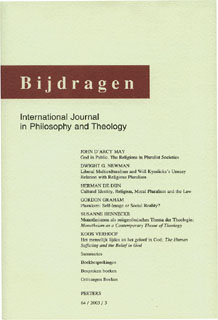next article in this issue  |

|
Document Details : Title: Burke and Kant on Fear of God and the Sublime Author(s): DECKARD, Michael Funk Journal: Bijdragen Volume: 68 Issue: 1 Date: 2007 Pages: 3-25 DOI: 10.2143/BIJ.68.1.2019441 Abstract : In the Critique of the Power of Judgment (1790), Kant mentions transcendental and physiological judgments in their relationship to the sublime. He further mentions that for the best physiological treatment, one must look to Edmund Burke’s A Philosophical Enquiry into the Origin of our Ideas of the Sublime and Beautiful (1757). Whereas for Burke, the feeling of the sublime “is based on the impulse toward self-preservation and on fear,” for Kant it is the mind that “is not merely attracted by the object, but is also always reciprocally repelled by it,” which provides the basis for the transcendental exposition of aesthetic judgements. How does a reading of Burke in which “we shrink into the minuteness of our own nature, and are, in a manner, annihilated before the almighty power,” on the one hand, and Kant’s view of relation and purposiveness in transcendental judgements, on the other hand, aid us in a deeper understanding of the fear of God? Furthermore, how might these two authors connect or interact with contemporary theories of emotion, specifically the discussion of ‘ambivalent emotions’? In this paper, I hope to both open a (historical) discussion of Burke and Kant in relation to their respective readings of the sublime and the fear of God as well as open a (contemporary) discussion of emotions regarding a ‘mighty object’ to whom my ambivalent emotion is directed. |
